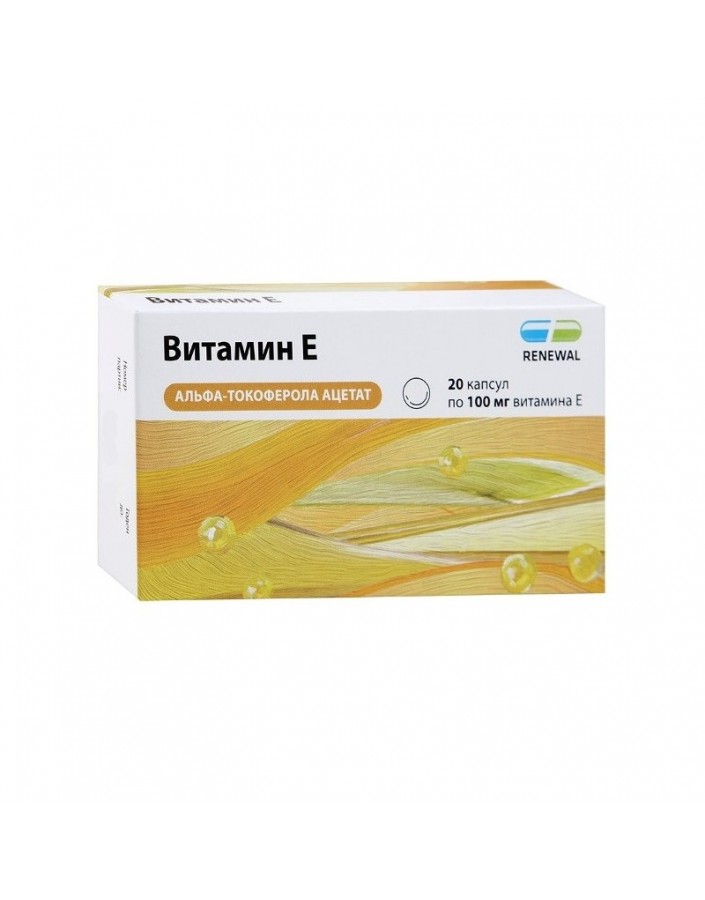




Security policy (edit with Customer reassurance module)

Delivery policy (edit with Customer reassurance module)

Return policy (edit with Customer reassurance module)
VITAMIN E
Red capsules, oval; the contents of the capsules are clear, light yellow colored oil.
10 pieces. - blister packs (2) - cardboard packs.
Vitamin has an antioxidant effect, is involved in the biosynthesis of heme and proteins, cell proliferation, tissue respiration and other important processes of tissue metabolism, prevents hemolysis of red blood cells, reduces the increased permeability and capillary fragility. It is necessary for the development and functioning of connective tissue, smooth and skeletal muscles, as well as for strengthening the walls of blood vessels. Takes part in the metabolism of nucleic acids and prostaglandins, the cellular respiratory cycle, in the synthesis of arachidonic acid.
It is a natural antioxidant, inhibits lipid peroxidation by free radicals. It activates phagocytosis and is used to maintain the normal resistance of red blood cells. In large doses, it prevents platelet aggregation.
It has a pronounced positive effect on the human reproductive system, slows down the development of atherosclerotic vascular changes.
With caution used in patients with severe cardiosclerosis, myocardial infarction, with an increased risk of thromboembolism; hypoprothrombinemia caused by vitamin K deficiency may worsen when using vitamin E in a dose of more than 400 IU.
During pregnancy and breastfeeding, taking the drug only on the recommendation of a doctor
|
1 caps |
|
|
vitamin E (tocopherol acetate) |
100 mg |
Auxiliary substances: sunflower oil - 100 mg.
The composition of the capsule shell: gelatin - 44.73 mg, glycerol - 14.67 mg, methyl para-hydroxybenzoate - 0.29 mg, dye azorubine - 0.31 mg.
Adults: 100 mg capsules - 2-4 caps / day; 200 mg capsules - 1-2 capsules / day; 400 mg capsules - 1 capsule / day.
For violations of the menstrual cycle (as a supplement to hormone therapy) 300-400 mg every other day, sequentially, starting from the 17th day of the cycle.
Possible: allergic reactions.
On the part of the digestive system: diarrhea, nausea, gastralgia.
Rarely, in patients with predisposition, creatinuria, an increase in the activity of creatine kinase, an increase in serum cholesterol level, thrombophlebitis, pulmonary thromboembolism, and thrombosis occur.
Enhances the effect of GCS, NSAIDs, cardiac glycosides. Increases the effectiveness of antiepileptic drugs in patients with epilepsy (in which the content of lipid peroxidation products in the blood is increased).
Iron increases the daily need for vitamin E.
Vitamin E enhances the effect of anticoagulants, if the doses exceed 400 ME / day.
It is not recommended to take other vitamin complexes containing vitamin E at the same time in order to avoid overdosing.
Prescribing high doses of vitamin E can cause a vitamin A deficiency in the body.
The simultaneous use of vitamin E in a dose of more than 400 IU per day with anticoagulants (coumarin and indandion derivatives) increases the risk of developing hypothrombinemia and bleeding.
Kolestiramin, Kolestipol, mineral oils reduce absorption.
High doses of vitamin E (400-800 mg / day for a long time) can cause visual impairment, diarrhea, dizziness, headache, nausea, fatigue, fainting, white hair growth in areas of alopecia with vesicular epidermolysis.
Very high doses (exceeding 800 mg for a long time) can causebleeding in patients with vitamin K deficiency; they can disrupt the metabolism of thyroid hormones and increase the risk of thrombophlebitis and thromboembolism in sensitive patients.